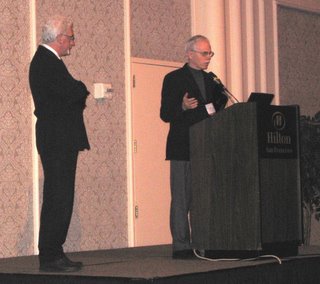I am at the closing session of EURO. This year’s conference was huge with more than 2000 participants. I did attend a good amount of the conference, though Prague has its own attractions.
 EURO (along with INFORMS, ALIO, and APORS) have a plenary given by the IFORS Distinguished Lecturer (I chair the committee that recommends the selection to the President of IFORS). This conference’s IDL is Bob Bixby, from Rice University and ILOG. Elise del Rosario introduced Bob, and here are some quotes from her introduction:
EURO (along with INFORMS, ALIO, and APORS) have a plenary given by the IFORS Distinguished Lecturer (I chair the committee that recommends the selection to the President of IFORS). This conference’s IDL is Bob Bixby, from Rice University and ILOG. Elise del Rosario introduced Bob, and here are some quotes from her introduction:
The IFORS Distinguished Lecturer for this conference is
Dr. Robert Bixby, an outstanding researcher, innovator, and business
leader. Dr. Bixby received his Ph.D. in the early 1970s from Cornell
University, and looked like he would have a long and distinguished
career in research on combinatorial structures. A sharp turn in the
1980s led him to develop CPLEX, an outstanding large-scale linear
program optimizer. CPLEX led to CPLEX Optimization, Inc, marketing
algorithms for linear and mixed-integer programming. CPLEX was sold
to ILOG in 1997, a company in which Dr. Bixby has served a number of
roles and where he is currently Chief Science Officer.Dr. Bixby has combined his business success with continued research
success. He, along with his colleagues David Applegate, Vasek
Chvatal, and Bill Cook have just published a book entitled “The
Traveling Salesman Problem: A computational study” that sum up their
20 years of work on solving large scale traveling salesman problems,
culminating the solution of TSPs with tens of thousands of cities.Dr. Bixby has held a number of leadership roles in our field,
including the presidency of the Mathematical Programming Society, and
has received a number of awards for this work, including the
Beale-Orchard-Hays Prize for excellence in computational mathematical
programming.
The title of his presentation was “From Planning to Operations: the Devil’s in the Details”. Unfortunately, I had to run out for a plane (for my 42 hour return to New Zealand) so I only got to see the first part, where he reviewed progress in linear programming and integer programming. A few striking points:
- The speed improvement in linear programming from 1996-2004 is a factor of about 5.3 million (3600 due to algorithms and 1300 due to computing).
- Not much improvement in linear programming the last few years: only computer speed improvements.
- (Mixed) integer programming is about 13 times fast over the same period.
- The next version of CPLEX provides another decrease in time required (by a factor of .6)
- The next version of CPLEX is much better at finding feasible solutions to MIP (a test set of about 1300 instances) went from 250 with no solution found in 100 seconds in CPLEX 10 to about 120 in the next version.
The main point of the rest of the talk is that MIP and other optimization models are going to be used increasingly for day-to-day decisions (not as an aid to decision making, but making the decisions directly) and that puts lots of pressure on our models and data.
 International Transactions of Operational Research
International Transactions of Operational Research I leave tomorrow for Iceland for the
I leave tomorrow for Iceland for the 